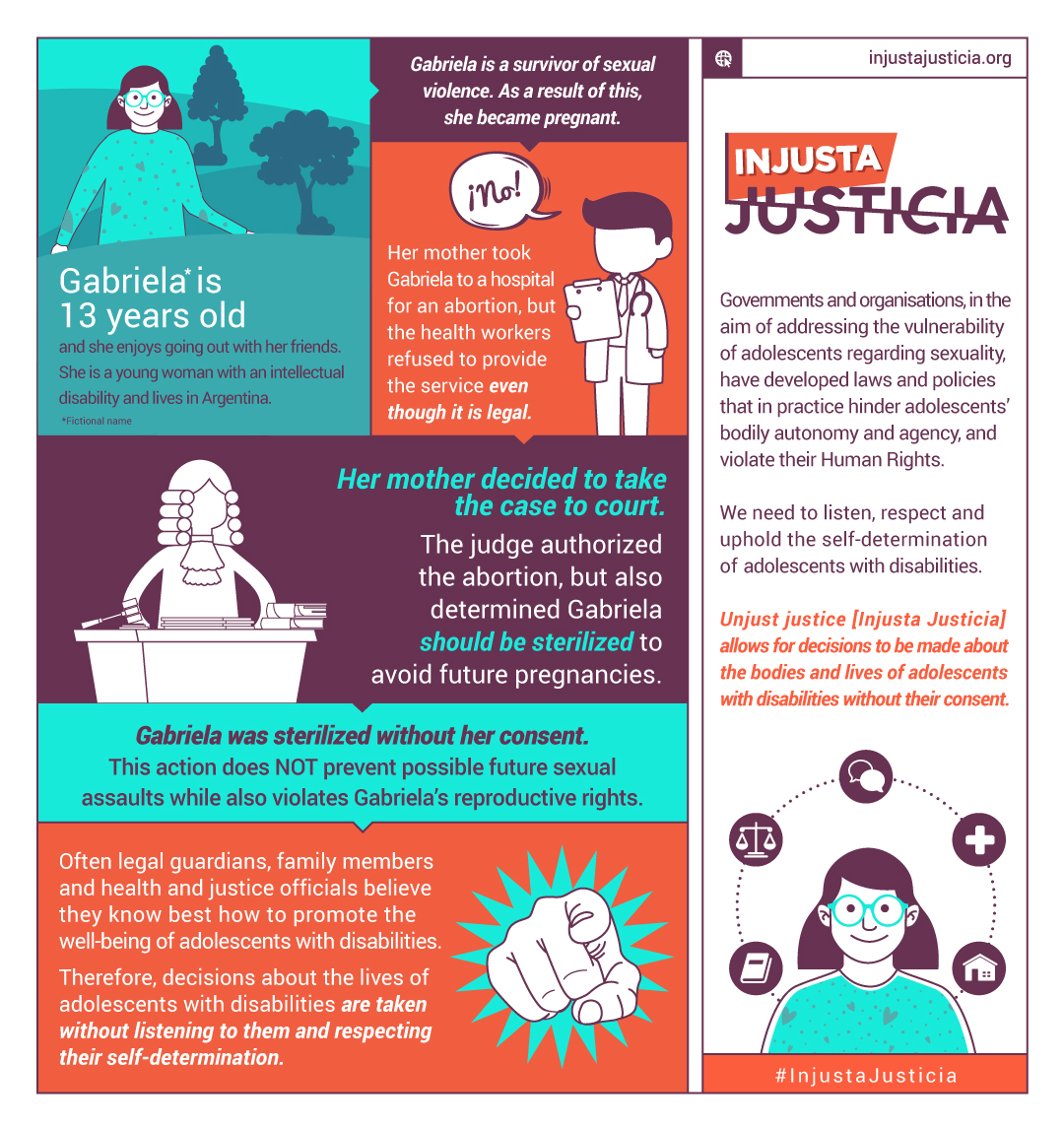Gabriela
Click here to get a full description of the infographic.

Gabriela’s sexual and reproductive rights were violated twice. First, public health workers denied her access to an abortion despite the fact that it is legal in Argentine for rape-related pregnancies (in accordance with the grounds for abortion stated in article 86 of the Criminal Code of Argentina). In order to perform the abortion, the medical staff, asked Gabriela’s mother for a court order, although the law, doesn’t state any requirement for a court order to access this procedure. When Gabriela’s mother appeared in court to request the abortion – which was authorized and performed – this young woman’s rights were violated again as the judge determined that, in addition to the abortion, it was necessary that she’d be sterilized.
The Convention on the Rights of Persons with Disabilities, CRPD (Convención sobre los derechos de las personas con discapacidad, CDPD) sets forth that the states should guarantee the protection of the rights and wishes of persons with disabilities, including their right to preserve their fertility, just as anyone else. Therefore, states must assure that people with disabilities are not sterilized without their consent and/or with someone else’s consent.
In this case, neither the medical staff nor the justice officials asked Gabriela for her wishes. They, and her mother – who took part in the decision, probably with good intentions, – decided that the best for Gabriela was to sterilize her. This reveals that the judicial and health systems often assume people with disabilities’ inability to make decisions in their lives and ignore the rights framework established in the CRPD. This results in serious violations to their rights.
The practice of sterilizing women and adolescents with disabilities without their consent is very common in the region and, in many cases, admissible under the state’s domestic legislation. Such is the case in Colombia, Mexico and Ecuador. It is common to resort to this practice in a misguided attempt to protect adolescents from sexual violence and potential pregnancies. However, sterilization does not prevent adolescents from being sexually abused. On the contrary, in a context where the prejudice that people with disabilities will never be able to raise their children themselves, sterilization is used as a means to lift the so-called “burden” that – by all accounts – they already lay on their families. This practice is by itself a serious form of violence and discrimination against women with disabilities because it projects and perpetuates stereotypes regarding the presumed (in)capacity to fulfill the roles of care inherently assigned to women without disabilities.
It is also necessary for the states to guarantee the access of people with disabilities to the support they need to raise their children by themselves. This is essential so that their financial needs and care don’t depend solely on their families. The lack of support systems in the region broadens inequality and this, in turn, affects adolescents’ possibilities to decide freely on their lives and sexuality.
Gabriela’s case is an example of how protectionist laws, although coming from the good intentions of families and the state, can have disproportionate consequences that hinder the autonomy of adolescents with disabilities.
-
States must protect the self-determination and free will of people with disabilities as established in the Convention on the Rights of Persons with Disabilities (CRPD). This entails that public servants must be trained to protect the rights of people with disabilities to make independent decisions about their health and sexual and reproductive life.
-
States must create comprehensive support and care systems for people with disabilities and their families. This would help secure the human, sexual and reproductive rights of adolescents with disabilities.
-
Adolescents with disabilities must also be provided with the support they need to make free and informed decisions. This should include the necessary safeguards so that their will is not assumed by other people.
-
If necessary, states must take all the appropriate steps specifically geared towards making sure girls and adolescents with disabilities have full enjoyment of their right to making autonomous decisions, free from all forms of violence, in adherence to Article 5 of the CRPD. These steps must be developed with the participation of girls and adolescents with disabilities and their representative organizations.
-
Additionally, the state must create and put care and support systems in place that give people with disabilities the capacity to raise their children independently, without relying on their family’s support. People with disabilities would then be able to make free decisions and live motherhood without limitations due to the lack of means and/or family resources.
-
Laws and legal provisions that allow the sterilization of people with disabilities without their consent or with the consent of others must be urgently repealed.
-
States must move towards the eradication of the stereotypes associated with people with disabilities, such as the prejudices about their (in)ability to make decisions in their lives or the general belief that they are not able to care for their children.
The Injusta Justicia campaign seeks to promote reflection on the limits of criminal law and punitivism as a defense strategy for sexual and reproductive rights, particularly those of adolescents. The campaign aims, among other things, to put the unforeseen consequences of the unrestricted application of criminal regulations and the impact this has on the autonomy and lives of adolescents under the spotlight. Injusta Justicia doesn’t have – or presume to have – all the answers but intends to inspire debate and to have the conversations we need as feminists to propose transforming strategies and alternatives focused on the survivors. We invite you to take part in this discussion.
Sexual and reproductive rights policy and regulatory framework in Argentina:
Policies that could have an impact the lives of adolescents in the region: